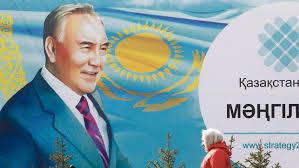EFF and Facebook repelled the attack of Kazakhstan in a US court
 For 15 years now, the Kazakh authorities have been persecuting one of the main opposition publications in the country - the Respublika newspaper. In 2012, after repeated accusations of “inciting social hatred” and “spreading extremism”, they seemed to succeed: the project’s founder, Russian journalist Irina Petrushkova found herself in exile, and the editorial office was forced to stop issuing a paper edition. But despite the blocking, injunctions and DDoS attacks, the Republic websites continue to operate on the Internet, they are hosted on servers in the USA.
For 15 years now, the Kazakh authorities have been persecuting one of the main opposition publications in the country - the Respublika newspaper. In 2012, after repeated accusations of “inciting social hatred” and “spreading extremism”, they seemed to succeed: the project’s founder, Russian journalist Irina Petrushkova found herself in exile, and the editorial office was forced to stop issuing a paper edition. But despite the blocking, injunctions and DDoS attacks, the Republic websites continue to operate on the Internet, they are hosted on servers in the USA.In recent years, the Kazakh authorities have unsuccessfully sought the closure of these sites. They use the American judicial system to threaten hoster and Facebook requests for private information about employees of the Republic.
To protect the freedom of information, the Electronic Frontier Foundation (EFF), which traditionally provides free lawyers in such cases, has come to grips with the Kazakh censorship.
In November, representatives of Kazakhstan summoned Facebook to a court demanding to issue names, email addresses, IP addresses and MAC addresses of users associated with the Republic account on Facebook and another user account. Information was requested to be submitted in connection with the current case of a violation of the Computer Fraud and Abuse Act (CFAA) in a federal court in New York. There the interests of the “Republic” are represented by the Electronic Frontier Foundation.
')
Kazakhstan lawyers argued that the IP addresses of the members of the “Republic” group on Facebook are needed in order to compare them with the IP addresses of unknown hackers who hacked the mailboxes of Kazakh officials, announcing corruption and other abuses. Archives of correspondence officials published on the site Kazaword .
However, Facebook refused to provide such information at the request of the Kazakh authorities. Then Kazakhstan sent a petition to the court of the Eastern District of California. There, both Facebook and the Electronic Frontier Foundation opposed the petition. As a result, Kazakhstan was forced to cancel the agenda to Facebook, demanding the release of information.
Judge Kendall J. Newman (Kendall J. Newman) based his decision on the fact that the petition was not authorized by a New York court. Kazakhstan expressed the argument that the petition was based on the fact that the New York court requested additional evidence from Kazakhstan, but Judge Newman found this argument inappropriate. In addition, he mentioned serious concerns about a possible violation of the First Amendment to the US Constitution, which guarantees freedom of speech to a citizen.
The petition was also rejected on the grounds that its execution would have given the Kazakh authorities too much additional confidential information about other Facebook users that are related to the “Republic”, but are not related to hacking the officials' mailboxes.
Surely, this is not the last attempt of the Kazakh authorities to get to journalists of the "Republic", but the Electronic Frontier Foundation promises to closely monitor the situation.
Source: https://habr.com/ru/post/355988/
All Articles